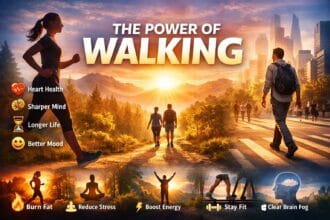Well, it’s pretty simple. Intermittent fasting is a diet plan where you alternate periods of eating and fasting. You can choose to fast for 16 hours or 24 hours (or even longer), but most people will do 16-hour fasts as part of their routine.

For instance, if you have a meal at 7 p.m., then you start your fast at 9 p.m. and break your fast at 11 a.m., that would be a 16-hour fast. The biggest idea behind the concept of intermittent fasting is that it helps reset your circadian rhythm, which is the internal clock that governs all your bodily functions, and gives it more time to burn fat stores instead of digesting food; that equates to lesser fat in your tummy!
So why not just skip breakfast instead?
Well, some people say that they lose weight quicker than if they were eating breakfast every day. However, if this doesn’t work for you, do not force your body to do something that does not work for you.
Why even follow intermittent fasting or any other diet plans in the first place?
Simple: just because they work. Well, there is a lot of ways to diet. Some swear by counting the calories, some like to cut the carbs, some would like to go vegan or vegetarian. And then there are the ones that swear by IF, allowing you to eat whatever you want.
It means that it’s possible to eat whatever you want during the 8 hours that lead up to bedtime, which is possibly when most people tend to go off track with their diets.
But which one is right for you?
The truth is, it doesn’t really matter. IF works for a lot of people and it doesn’t work for a lot of people. It has so many benefits, and it really boils down to finding what is best for your body and lifestyle. If counting calories every day until the day you die is what does it for you, then do it.
But here is why we recommend Intermittent Fasting:
It is easy to follow, doesn’t require any special equipment or supplements (all you have to do is eat in an 8-hour window (from noon until 8 pm, etc.)), and if you’d rather not count calories but still want to be at the mercy of keeping track of everything you put in your mouth all the time, then this just might be the thing for you. It will benefit you, and this is a good choice if you decide to give it a shot.
- It makes losing weight easier.
- It helps you get rid of cravings for unhealthy foods and drinks, so it is easier to stick to a diet plan.
- By fasting intermittently, you will feel an increase in energy and a decrease in your stress level, making it easier to focus on other things in life.
- It will increase your metabolism, burning fat more quickly. As there will be fewer calories in your system during periods of fasting, your body has to burn the fat stores for fuel instead of just relying on easy-to-get carbohydrates from foods like breads or cereals.
- A stronger immune system: The body perceives that it is starving during fasting, and in a bid to survive, the body responds by releasing growth hormones. You can thus repair yourself and handle illness better than under regular eating conditions.
- Improved blood sugar levels & Improved insulin sensitivity: Intermittent fasting has been shown to ramp up human growth hormone (HGH), and help you gain muscle mass and lose fat. It also contributes to improvement in insulin sensitivity, which can, in turn, assist in regulating blood sugar levels while lowering the levels of insulin required. You should also try to drink plenty of water each day, as it will help keep your metabolism running smoothly and also help flush out toxins from the system that could be causing bloating or constipation; both things that can cause us to feel sluggish when trying intermittent fasting, so make sure they’re not something else that induces these symptoms!
Also read – Secrets of a Millionaire Mindset
It is said that intermittent fasting boosts weight loss, insulin sensitivity, and brain power, so surely there are quite a few advantages.
But certainly, like everything else in the world, it also has its share of disadvantages:
- Every now and then, individuals start experiencing side effects like headaches, dizziness, and fatigue. However, being conscious of the period of fasting and the amount of water being consumed might make these signs vanish quite quickly.
- If you are diabetic or hypoglycemic (low blood sugar), then intermittent fasting is not for you. It can actually make your blood sugars even worse than they were before! If it sounds like this might be a problem for you, then it is best to talk to your doctor before setting out onto any kind of diet or exercise program, for him or her to help ensure you are healthy. It is quite important for one to consult with his or her doctor before embarking on any form of diet or exercise program, so the program doesn’t adversely affect his or her health. This is sure to stress out your adrenals and make them pump out unnecessary cortisol into your system, completely messing with your sleep cycle.
Intermittent fasting has gained significant popularity not only among health enthusiasts but also among renowned celebrities and public figures.
Famous personalities such as Jennifer Aniston, Hugh Jackman, and Chris Hemsworth have openly endorsed intermittent fasting as part of their wellness routines. Jennifer Aniston follows the 16:8 method, fasting for 16 hours and eating within an 8-hour window, which she credits for her glowing skin and sustained energy levels. Hugh Jackman used intermittent fasting to achieve his impressive physique for roles like Wolverine, combining it with intense workouts. Chris Hemsworth, known for his role as Thor, also practices intermittent fasting, attributing it to his lean muscle gains and overall fitness. Their endorsement of this eating pattern has inspired many fans to adopt intermittent fasting in pursuit of similar health benefits and lifestyle transformations.
Intermittent fasting is a good tool to be used in weight loss, but it should be used along with a healthy diet, not as a method to completely eliminate food. If you’re going to lose weight and get healthy, then intermittent fasting part-time may be awesome. But, practice it wisely, and listen to your body.
For more info on health related topics check The Logic Stick






